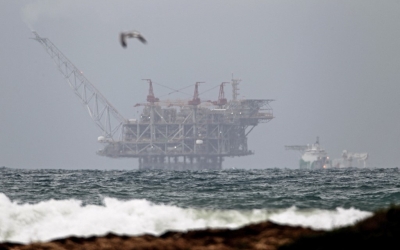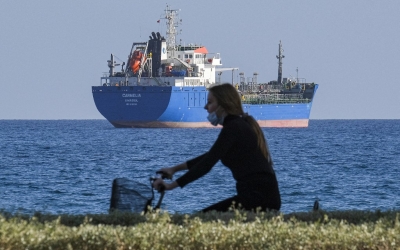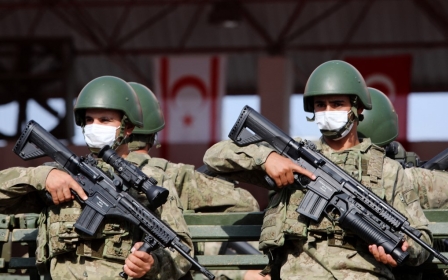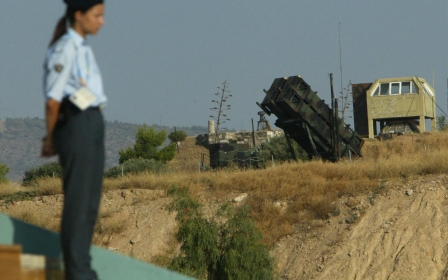Greek and Israeli defence ministers meet after US ends support for EastMed pipeline
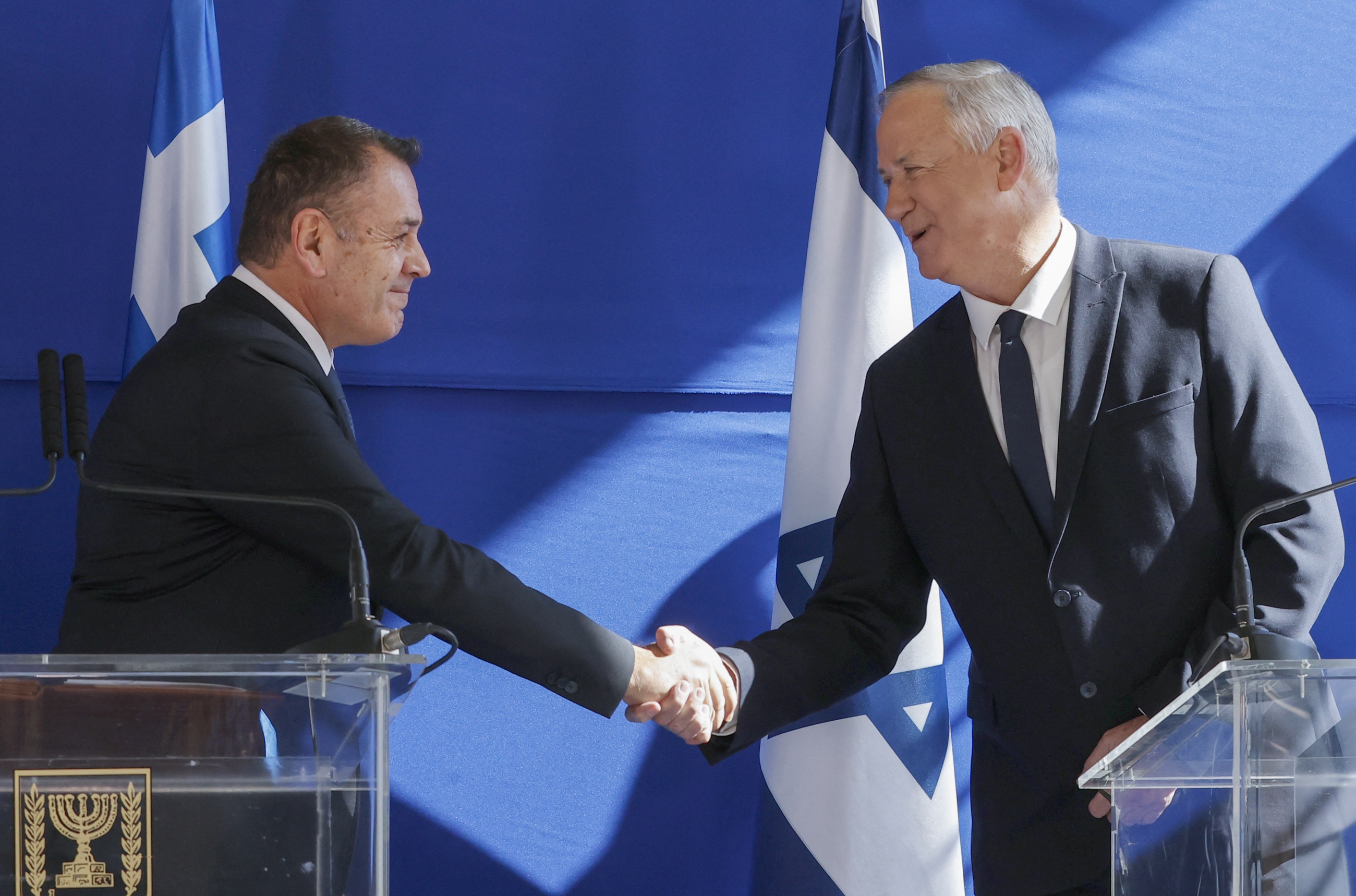
Greece and Israel's plans to construct a flagship gas pipeline received a fresh blow this month after the US reportedly said it was "shifting" its support for the project. Yet, the news from Washington masks the emergence of a thriving relationship between the two countries.
Greece and Israel, along with Cyprus, signed an agreement in 2020 to construct an 1,180-mile pipeline that would see Israeli and Cypriot gas shipped to mainland Europe via Greece.
But on Tuesday, the Jerusalem Post reported the Biden administration had informed the three countries that Washington no longer supported the proposed EastMed natural gas pipeline.
Middle East Eye reported earlier this month that Washington had silently abandoned the project, sending Greece its concerns about it in a "non-paper", an unofficial diplomatic correspondence.
Analysts and former officials who spoke with MEE brushed off the recent news as unwelcome but expected, with admitted long-standing financial difficulties around the project.
'Israel will not be tempted by the Erdogan regime's siren song,'
- Eran Lerman, former deputy director of Israel's National Security Council
"The reality of the pipeline has always been the political will for Greece, Cyprus and Israel to work together in the region," Antonia Dimou of the Athens-based Institute for Security and Defence Analysis told MEE.
"Our relationship with Israel today has moved so far beyond a single pipeline, there is much more depth and breadth," she added.
On Thursday, Greek Defence Minister Nikolaos Panagiotopoulos travelled to Israel to meet his counterpart, Benny Gantz.
High on the agenda for the meeting, Dimou said, were Greek efforts to acquire Israel's state-of the-art Iron Dome missile defence system and to proceed with a plan for the country to help upgrade three of the Greek military's aging Hercules helicopters.
Panagiotopoulos' arrival, just days after Washington's about-face on the pipeline, will also be an opportunity for the two countries to shore up their partnership.
"The Greek defence minister will seek, and indeed receive [from Israel], reassurances that even if the EastMed pipeline becomes a pipe dream, we are still committed to the alignment," Eran Lerman, former deputy director of Israel's National Security Council, told MEE.
A Mediterranean fig leaf
The doubts raised by the Biden administration about the EastMed pipeline's economic and practical viability are not new.
And while the Trump administration backed the plan as a way to diversify Europe's energy dependence away from rivals such as Russia, the pipeline irked Turkey, which has long had a festering maritime rivalry with Greece.
In 2019, Turkey signed a maritime agreement with the UN-recognised government of Libya that Athens says ignores its rightful claims to Exclusive Economic Zones (EEZ) in the Mediterranean - the pipeline would traverse those contested waters.
It was Turkey's foray into Libya, as part of its more muscular foreign policy in the region under President Erdogan, that initially brought Greece and Israel closer together.
The alignment of the two Mediterranean countries, who had minimal contact for decades, is no small feat, and in some ways has mirrored the economic and political changes driven by Israel’s normalisation with Arab states.
Greece, which has historic ties to the region going back to its large Levantine diaspora and the Orthodox Church, was the last EU country to establish full relations with Israel.
For its part, Israel had previously looked to Turkey, Greece's arch-rival, as its main Muslim-majority partner in the region.
Hay Eytan Cohen Yanarocak, an expert on Turkey-Israeli relations with the Jerusalem Institute for Strategy and Security, told MEE that the two countries had moved past the EastMed pipeline.
"The project was always going to be very hard to implement, but it served as fig leaf to come together for bigger things," he said.
The pipeline was announced as a major effort of the tripartite framework Israel and Greece formed along with neighbouring Cyprus in 2016 to engage in regular high-level summits that would link their economies and enhance security cooperation.
Another project stemming from that forum is an effort now underway to link the three countries' energy grids, and Egypt's, via the EuroAsia and EuroAfrica Interconnectors. The US reaffirmed its backing of the plan as it quietly walked away from the pipeline.
But it is in tourism where the relationship has really boomed.
Nearly one million Israelis - of its nine million people - visited Greece in 2019. There are now regular flights between the Greek islands and Israel, and Israelis have become big homebuyers in a country where 20 percent of GDP is dependent on tourism.
"Our relations with Israel have never been better," Greece's Prime Minister Kyriakos Mitsotakis said enthusiastically during a meeting with Israeli Prime Minister Naftali Bennett in December.
As the number of Israeli visitors to Greece has grown, so have the countries' security ties.
Greece's strategic location in the region has made it an ideal host of joint military drills with Israel and the UAE. Frequent naval exercises are held with partners such the US, while Israeli forces train in Cyprus - where the terrain is similar to that of Lebanon.
Last year Greece signed a record $1.68bn military contract with Israel's Elbit Systems to build and operate a new air force training school in Kalamata, Greece.
Israeli Foreign Minister Yair Lapid boasted in an interview with Greek media last year that his country had a "strategic alliance" with Greece and "burgeoning defence ties".
Erdogan's 'siren song'
Thursday's visit by the Greek defence minister demonstrates the importance Athens places on Israeli relations, amid signs that its old rival, Turkey, might be warming to Israel again.
Battered by economic crises at home and a sinking currency, Erdogan has already turned to one-time foes such as the UAE for an economic life-line. And he has indicated he is open to reviving ties with Israel, which has remained a robust trade partner, despite political tension.
Athens and Nicosia are taking notice. "The Cypriots and Greeks are very much concerned about a new rapprochement between Israel and Turkey," Yanarocak said.
Speaking with reporters this week Erdogan said the country was looking to "cooperate on a win-win basis" with Israel, adding that talks were underway for a potential visit of Israeli President Isaac Herzog to the country.
With Turkey's population of 83 million and the second-largest army in Nato, Israeli officials say Ankara is still a valued partner, but Lerman says it will be careful in its approach.
"Israel will not be tempted by the Erdogan regime's siren song," said Lerman. Israel's political leaders are "good on" ensuring any normalisation with Ankara doesn't come at the expense of Greece, he added.
With the apparent collapse of the EastMed pipeline, Erdogan has wasted little time pointing out that a plan to ship Israeli gas to Europe "cannot work without Turkey". and is floating his country as a convenient alternative route to enter Europe's market.
Analysts say that plan may be just as far-fetched as the EastMed pipeline, as gas exports would likely have to transit through Cyprus, and the island's maritime zone.
But Cyprus remains divided into the predominantly Greek internationally recognized government in the south and a breakaway Turkish north, recognised only by Ankara.
Lack of a political solution to the decades-old feud between the two has prevented the island from tapping its own energy resources. Yanarocak says Israel would be loath to break with its new Greek and Cypriot partners, despite Erdogan's overtures on a deal.
"Israel will not sell out Cyprus for some cash on a gas deal with Turkey," Yanarocak said.
Middle East Eye propose une couverture et une analyse indépendantes et incomparables du Moyen-Orient, de l’Afrique du Nord et d’autres régions du monde. Pour en savoir plus sur la reprise de ce contenu et les frais qui s’appliquent, veuillez remplir ce formulaire [en anglais]. Pour en savoir plus sur MEE, cliquez ici [en anglais].


